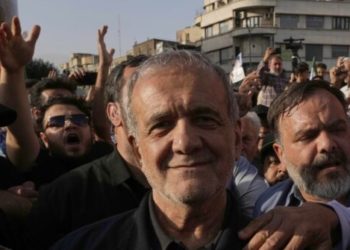Gulf Arab countries that host U.S. military bases issued a series of statements on Sunday expressing dismay over the American attack on Iranian nuclear facilities — while pointedly stopping short of condemning the United States, their main ally.
Saudi Arabia’s Foreign Ministry called for de-escalation and restraint, saying that it was following the situation with “deep concern.”
Qatar’s Foreign Ministry — in a grammatically acrobatic statement that did not name the United States at all — said that it regretted “the deterioration of the situation with the strikes on Iranian nuclear facilities,” expressing hope that all parties would “exercise wisdom” and restraint. That stood in contrast with the directness of Qatar’s statement the day before, in which the country’s prime minister had condemned Israel by name, saying the Israeli attacks against Iran constituted “a flagrant violation of Iran’s sovereignty and security.”
Kuwait and the United Arab Emirates also avoided mentioning the United States, while expressing “deep concern” at the bombing of Iranian nuclear facilities in Kuwait’s case and “profound concern” in the case of the Emirates.
Fossil-fuel-rich Gulf countries host tens of thousands of U.S. military personnel. The American bases on their lands — along with oil and gas-producing infrastructure that is vital to the global economy — could be prime targets for Iranian retaliation against the United States.
In a statement on Sunday, the Islamic Revolutionary Guards Corps of Iran appeared to threaten the American bases, saying that they were a vulnerability and “not points of strength.”
Bahrain, an island nation in the Persian Gulf with a U.S. naval base, asked a majority of its civil servants to work from home and warned residents to use main roads “only when necessary.”
Saudi Arabia and the Emirates have sought to chart more independent foreign-policy courses — and to diversify their sources of weaponry — over the past few years. But they remain highly dependent on the United States to defend them when their territories come under attack, as they have by Iran-backed militias in the past.
In an attempt to ward off that danger, both countries have shifted toward a policy of cultivating ties with Iran, seeing diplomacy as a more pragmatic way to contain their neighbor. Those warmer relations mean that Iran may be less likely to target their countries than it was in the past. But fears remain.
Behind the calls for de-escalation are worries of what wider violence could do to the national and regional projects of the Gulf’s authoritarian rulers, who have tried to diversify their economies away from fossil fuels by turning their countries into global hubs for finance, tourism and trade.
“The longer a war takes, the more dangerous it becomes,” Anwar Gargash, diplomatic adviser to the Emirati president, told journalists in a briefing on Saturday shortly before the American attack. “There are many issues in the region. If we choose to tackle everything with a hammer, nothing will be left unbroken.”
The Foreign Ministry of Oman, which had been serving as a mediator in nuclear negotiations between the United States and Iran before those talks collapsed in the wake of Israel’s surprise attack on Iran on June 13, issued the strongest-worded statement among the Gulf countries. The ministry expressed “deep concern and condemnation regarding the escalation resulting from the direct airstrikes conducted by the United States,” adding that the American attack was a “serious violation of international law.”
But even Yemen’s Iran-backed Houthi militia — whose slogan includes the phrase “death to America” — stopped short of threatening American bases in the region. Before the U.S. attack, the Houthis had warned that they would break the truce reached in May with the United States and target American ships in the Red Sea if President Trump decided his country should enter the conflict.
After the U.S. attack, the Houthis said only that they were “prepared” to target American ships, without elaborating.
Mohammed al-Bukhaiti, a Houthi official, said on social media on Sunday that the Houthis would “stand by any Arab or Islamic state that faces Israeli or American aggression,” but then added that they would not be “more kingly than the king” — an Arabic expression akin to “holier than the pope.” He did not respond to a request for comment asking for clarification.
Ismaeel Naar contributed reporting from Dubai, United Arab Emirates, and Shuaib Almosawa contributed reporting from Sana, Yemen.
Vivian Nereim is the lead reporter for The Times covering the countries of the Arabian Peninsula. She is based in Riyadh, Saudi Arabia.
The post Gulf Countries Voice Concern After U.S. Attack on Iran Nuclear Sites appeared first on New York Times.




